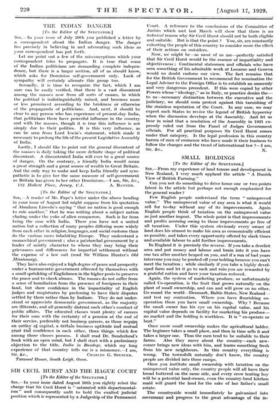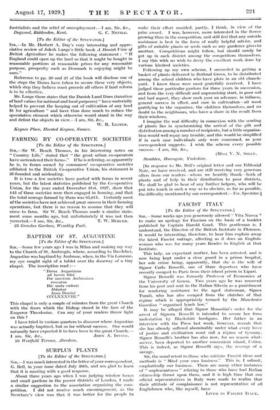SMALL HOLDINGS
[To the Editor of the SPECTATOR.]
Sm,—From my experience of land tenure and development in New Zealand, I very much applaud the article " A Danish View of British Farming."
Can you not do something to drive home one or two points latent in the article but perhaps not enough emphasized' for the general reader ?
Few English people understand the term " unimproved value." The unimproved value of any area is what it would sell for to-day without any of its improvements. Again English people think of taxation on the unimproved value as just another impost. The whole point is that improvements and profits accruing owing to those improvements go free of all taxation. Under this system obviously every owner of land does his utmost to make his area as economically efficient as possible, and takes every opportunity offered by slack times and available labour to add further improvements.
In England it is precisely the reverse. If you take a derelict area and put money and labour and brain into it you have one tax after another heaped on you, and if a run of bad years intervene you may be pushed off your holding because you can't meet the taxation ; while similarly if you take a highly devel- oped farm and let it go to rack and ruin you are rewarded by a grateful nation and have your taxation reduced.
Again, the system of marketing produce, so unfortunately called Co-operation, is the fruit that grows naturally on the plant of small ownership, and can and will grow on no other. Go round the world—Denmark, Baltic States, New Zealand— and test my contention. Where you have flourishing co- operation there you have small ownership. Why ? Because the small owner has his eye on his capital value, and his capital value depends on facility for marketing his produce— no market and the holding is worthless. It is " co-operate or bust."
Once more small ownership makes the agricultural ladder. The beginner takes a small place, and then in time sells it and takes a larger one. Thus the men tend to be suitable to their farms. Also they move about the country—each new- comer brings new ideas with him, and learns something fresh from his new neighbours. In this country everything is wrong. The townsfolk naturally don't know, the country people are divided into three camps.
Once you institute small ownership with taxation on the unimproved value only, the country people will all have their bread buttered on the same side, and every crow tenting boy will be a potential land-owner, even the country-bred kitchen maid will guard the land for the sake of her father's small estate.
The countryside would immediately be galvanized into movement and progress to the great advantage of the in- dustrialists and the relief of unemployment.—I am, Sir, &c.,

































 Previous page
Previous page